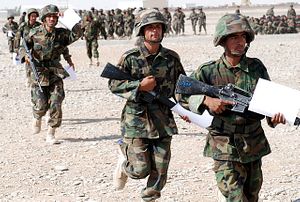Late last week, the United States formally brought its 13-year-long campaign in Afghanistan, Operation Enduring Freedom, to a final close. However, heading into the new year, the U.S. will leave behind a 10,000-strong troop contingent for training the Afghan army and security forces, and for limited counter-terrorism operations under the rubric of the U.S.-Afghanistan Bilateral Security Agreement (BSA). Observers of Afghan affairs have been aware for some time that the end of 2014 would be a major milestone for the country. 2014 was a year of preparing Afghanistan for the future: the country held historic elections and prepared to move away from the leadership of Hamid Karzai, its effective leader since the Bonn Conference in 2001, and from a persistent U.S. and NATO troop presence. 2014 was a year of immense political and military transition for Afghanistan. What are the major challenges for the country heading into 2015?
First, and most pressing, is the issue of security. As U.S. troops prepare to leave Afghanistan, widespread reports suggest that the Taliban is intensifying its campaign to return to areas that the United States had previously captured during its war in Afghanistan. The Wall Street Journal reports this week that more Afghan soldiers died fighting the Taliban in 2014 than in any year since the U.S. invasion. While the Taliban’s overall territorial control remains muted, the mere fact that the group is able to bring death and sorrow to Afghan civilians and Afghan troops on a regular basis poses an immense challenge from the relatively new national unity government led by President Ashraf Ghani and Chief Executive Abdullah Abdullah. Afghanistan’s inherent political clientelism and weak central government presence in the country’s borderlands has in the past led to civilians valuing the protection of local warlords over the government in Kabul — effectively challenging the legitimacy of the central government in the process. Should Afghanistan’s security situation continue to deteriorate dramatically in 2015, there will be political consequences for the central government.
Speaking of the government, the second most pressing challenge for the country heading into 2015 will be for the national unity government to ensure that it can serve the country’s diverse constituencies while at the same time keeping its own bureaucratic house in order. I’ve written before about my initial skepticism regarding the efficacy and long-term stability of a power-sharing deal; it will be up to Ghani and Abdullah to prove that their government is capable of moving Afghanistan forward. One positive element of Ghani’s leadership compared to his predecessor Karzai has been his willingness to work with the United States. Ghani sent a positive message when his first act as president was the conclude the long-stalled BSA with the United States. Though the United States may be formally closing a chapter of its military history in Afghanistan, its involvement in the country, both diplomatically and economically, will continue. Additionally, Ghani has demonstrated great interest in approaching Afghanistan’s two most proximal powers: India and China. Both these countries have shown that they will expand their involvement in Afghanistan starting next year. The Afghan government should do all it can to encourage this.
Finally, the third set of challenges facing Afghanistan concerns the country’s economic future. Many an optimistic report has been written about Afghanistan’s vast and untapped natural resource wealth. While both Afghan firms and foreign investor-backed initiatives are attempting to turn this great potential wealth into a real source of longterm national economic livelihood for the country, the Afghan government has other pressing concerns including making higher education more widely available within the country, addressing unemployment in the country’s major cities (most notably, Kabul), and encouraging small business owners and entrepreneurs to pursue their ambitions within Afghanistan. None of these issues have a quick and easy policy prescription, and all will likely take longer than a single year to address comprehensively. Nonetheless, the Afghan government will need to seize the opportunity in 2015 to address these issues.

































